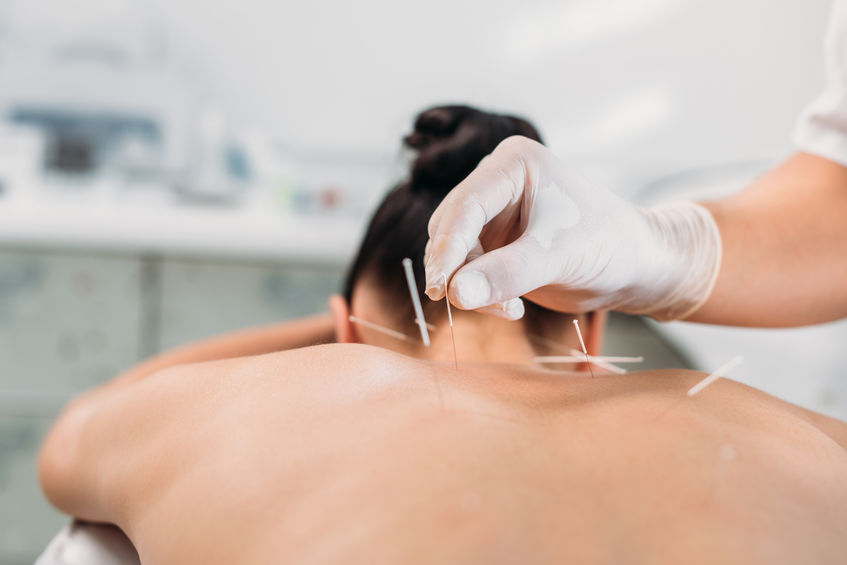 Psoriasis is a chronic autoimmune disorder that causes inflamed and scaly patches on the skin characterized by a reddish appearance. It can also cause stress and anxiety because of itching, swelling, pain and the skin’s appearance. Acupuncture has been found to be an effective treatment for managing the symptoms and flares of Psoriasis.
Psoriasis is a chronic autoimmune disorder that causes inflamed and scaly patches on the skin characterized by a reddish appearance. It can also cause stress and anxiety because of itching, swelling, pain and the skin’s appearance. Acupuncture has been found to be an effective treatment for managing the symptoms and flares of Psoriasis.
Acupuncture is a traditional Chinese medicine practice that entails placing tiny needles on various points of the skin. Many patients have benefited massively from this holistic treatment, which is done to stimulate certain points and reactions within the body. Apart from psoriasis, acupuncture is used as an alternative for a variety of medical conditions that affect negatively on the health of an individual. In this article, we will be looking at the effectiveness of acupuncture as a treatment for Psoriasis, its benefits, and experts’ views on this type of treatment.
How is Acupuncture Done?
Acupuncture uses special tiny needles that are placed at various points to allow energy to flow freely throughout your body. These needles are thinner than what doctors and other physicians use to dive injections or draw blood because they only penetrate the surface of the skin. Acupuncturists generally believe that this procedure can help prevent certain health conditions.
You may be required to remove some of your clothing during an acupuncture appointment to allow the practitioner to access different parts of the body such as your back, neck, ankles, and wrists. The practitioner will ask you to lie down on a bed and cover yourself with a sheet or blanket to keep warm. The acupuncturist will then wipe areas that he/she intends to stimulate using alcohol before tapping the needles lightly into the specified points on your body.
In some cases, electrical or heat stimulation is used on the needles to enhance the effect. The needles are then allowed to stay on the skin for some time before they are removed and disposed of in a sharps container. Some practitioners may use heat lamps, soft music and other comfort measures to keep you relaxed while the needles are still on the skin. It is important to understand that acupuncture is not a quick fix and you may require several visits to your acupuncturist before you see any positive results.
Benefits of Acupuncture
- It Helps Relieve Pain
Acupuncture promotes the release of endorphins, which in turn assist to reduce pain. It helps to reduce inflammation, which is the primary cause of pain by needling polar areas of the body strongly connected to each other through the nerves. As a result, blood passes through areas of pain thus creating a relief.
- Reduces Stress
During high-stress levels, the body responds by releasing cortisol hormone, which suppresses the immune system and increases your level of anxiety and depression. The acupuncture needles awaken the process and stress responders, creating a feeling of relaxation. It helps to stabilize your mood and you may experience happier emotions when blood starts to flow better.
- It Boosts Your Immunity
An electric activity is stimulated when acupuncture needles are inserted into the surface of the skin thus promoting strong immunity. This means that your body becomes well equipped to fight against disease-causing microorganisms and other viruses. This holistic treatment also has anti-inflammatory effects that help boost blood flow when the needles create a natural electrical stimulation in the body.
Potential Risks of Acupuncture
Acupuncture has undergone extensive research over the past years and is backed up by strong anecdotal evidence that supports its effective treatment for Psoriasis. However, not everyone may benefit from acupuncture since some tend to experience mild soreness that fades away in a short while after treatment. Generally, acupuncture has very few side effects when a trained and licensed practitioner conducts it in a clean environment.
It is also important to get regular treatment to get flares under control. To some, this may seem expensive and time-consuming, especially when your insurance company cannot cover it. The procedure could also increase the chance of bruising or bleeding for people with bleeding disorders. Before starting the procedure, it is important to talk to your acupuncturist about any underlying health conditions or your family’s medical history.
Acupuncture is an effective treatment for relieving stress, which is a common trigger for psoriasis symptoms and flares. It can also help relieve pain especially for people suffering from psoriatic arthritis. Acupuncture has strong anecdotal evidence for treating various health conditions and has been used over the past years to alleviate the symptoms of psoriasis.

